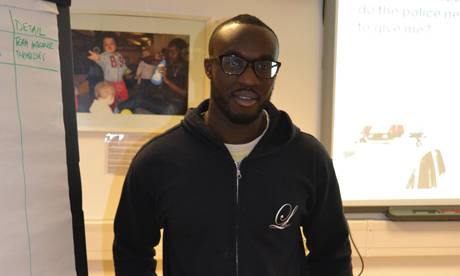‘Use of stop and search powers still alienating young people’

Deji Adeoshun, youth programmes project manager at Hackney Council for Voluntary Service (HCVS). Photograph: Russell Parton
Hackney is the leading London borough in terms of stop and search arrest rates, but more could still be done to prevent this controversial police power from alienating young people.
This is the verdict of Deji Adeoshun, Youth Programmes Project Manager at Hackney Council for Voluntary Service (HCVS).
For the past 18 months he has been running a young people’s monitoring group on stop and search – the only group of its kind in London – and he says that when it comes to deescalating a potentially tense situation on the street, the onus should be on the police.
“There has been a lot of talk about how young people should be calm when they are stopped and searched,” he says, “but I’m an adult and I find it really hard to be calm in that situation.
“I’ve been stopped and searched in my vehicle on my way to work, and I get really annoyed.
“You can’t help it, because you just think, ‘What?!’
“I think the focus should be on officers being the ones who should calm the situation down.
“What they have to do is maintain their professionalism. If they rise to what the young person is doing and get angry, that’s how things escalate.”
Stop and search is controversial because of its association with alleged racial profiling. Black and Asian people are still far more likely than white people to be stopped by police, according to the Equality and Human Rights Commission.
Among young people in Hackney, there is still distrust of the police – Mr Adeoshun says he is yet to meet a young resident of the borough who aspires to a career in the Met – but thanks partly to the bridge-building fostered by HCVS, things are slowly changing.
“Young people know stop and search is necessary and they know why the power is used,” says Mr Adeoshun. “So they are under no illusions, and I doubt you are going to find many young people saying stop and search should be eradicated. I think young people accept it is a useful power to get weapons and drugs off the street. Their main concern is how it’s being implemented.”
According to Mr Adeoshun, the tone struck by individual officers during a search is crucial to ensuring it runs smoothly, and the attitudes of onlookers can also make a difference.
“If you walk out onto the street and see a police van and someone being stopped and searched, you would immediately think ‘What has that person done?’” he says. “There is already an element of suspicion, even though it’s not necessarily that they are a criminal or are suspected of being a criminal. It is just that the police happen to have intelligence that has led them to come to that particular individual and they are just going to double check as a precaution.”
The more the public understands that being stopped and searched implies no guilt, the less likely such searches are to get young people’s hackles up.
Complaints from members of the public who feel aggrieved by the approach adopted by officers can also help improve matters, and HCVS is encouraging residents to voice any concerns they might have about their local police.
“If you speak to people in general, sometimes they’re not happy with the police, yet the number of complaints, at least from young people, is miniscule,” says Mr Adeoshun. “We’re not saying we want to see a whole load of complaints but if there are people who genuinely have issues of concern and are aggrieved, they should feel empowered to voice those. We don’t know how we’re going to tackle that yet, but that’s definitely something that’s on our mind.”
Related:
Over a decade after Stephen Lawrence inquiry, how has stop and search changed?
